Mayoral races could temporarily cost Democrats their majority in the state House
- Oops!Something went wrong.Please try again later.
Michigan Democrats could soon lose their majority in the state House without losing an election. At least temporarily.
Two Democratic state representatives are running for mayor in their respective cities: Kevin Coleman in Westland and Lori Stone in Warren. If they win, they'll vacate their seats in the Legislature early before finishing their terms.
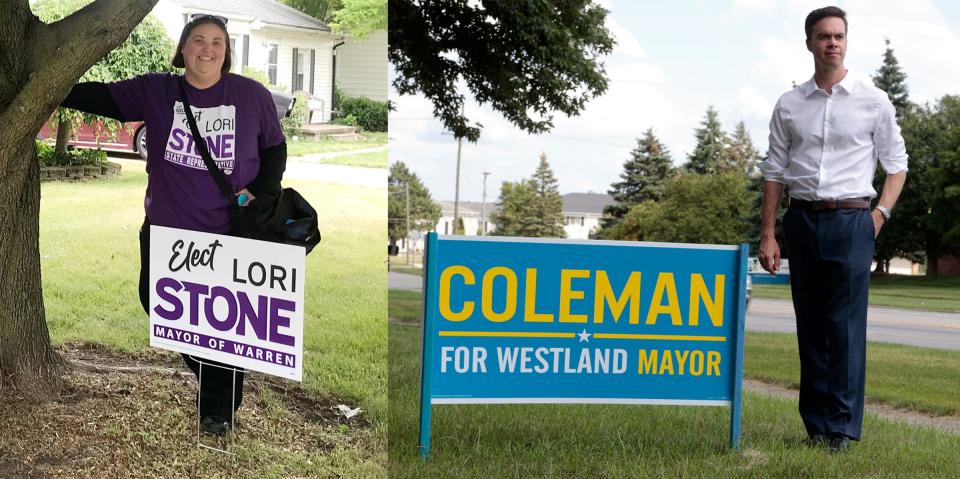
Their mayoral bids come after they were both reelected to the state House with historic victories for their party: Democrats secured control of both chambers of the Legislature for the first time since 1983. Democrats used their new − but narrow − majorities to undo GOP labor laws, enact new gun safety measures and remove abortion restrictions.
City elections this fall could usher in another shift in state politics, one that hasn't occurred in nearly 30 years. If both Coleman and Stone win mayoral elections, they would leave behind a split state House with 54 Democrats and 54 Republicans. The last time the chamber was evenly divided along partisan lines was in 1994.
Both Coleman and Stone said Democratic control of the Legislature complicated their decisions to seek local office.
"It'd be an easy thing to stay at the state and continue the great track record that we have, but I'm not willing to let my hometown suffer because I didn't step up and do the right thing," Coleman said. He sees a "void in leadership" in Westland and decided to run following former Mayor Bill Wild's decision to step down after serving since 2007.
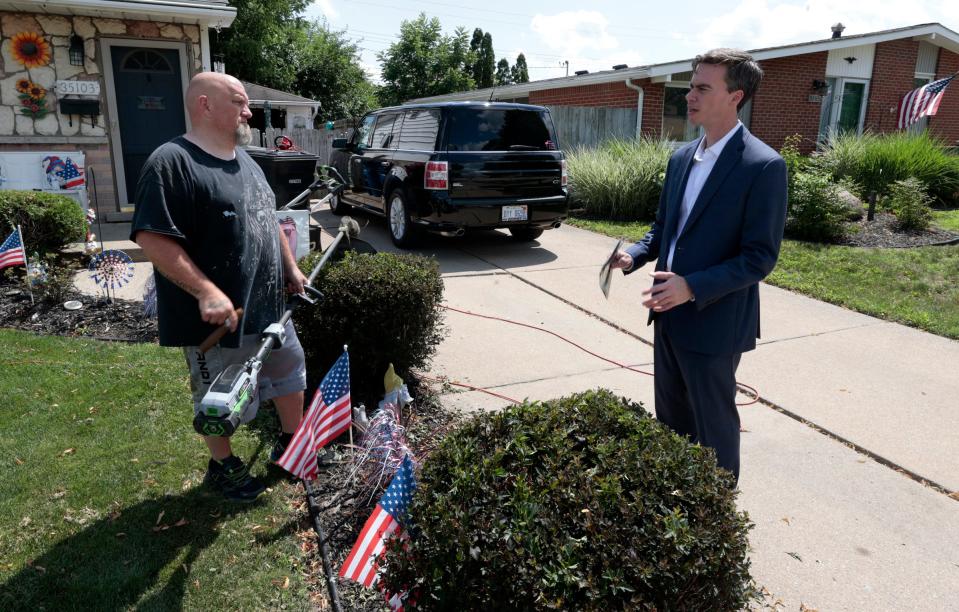
"I love what I do in the Legislature," said Stone. "And now I'm in the majority which I've worked so hard for." But she said she decided to follow calls from her constituents urging her to run because she said she didn't see her values reflected in the field of mayoral candidates.
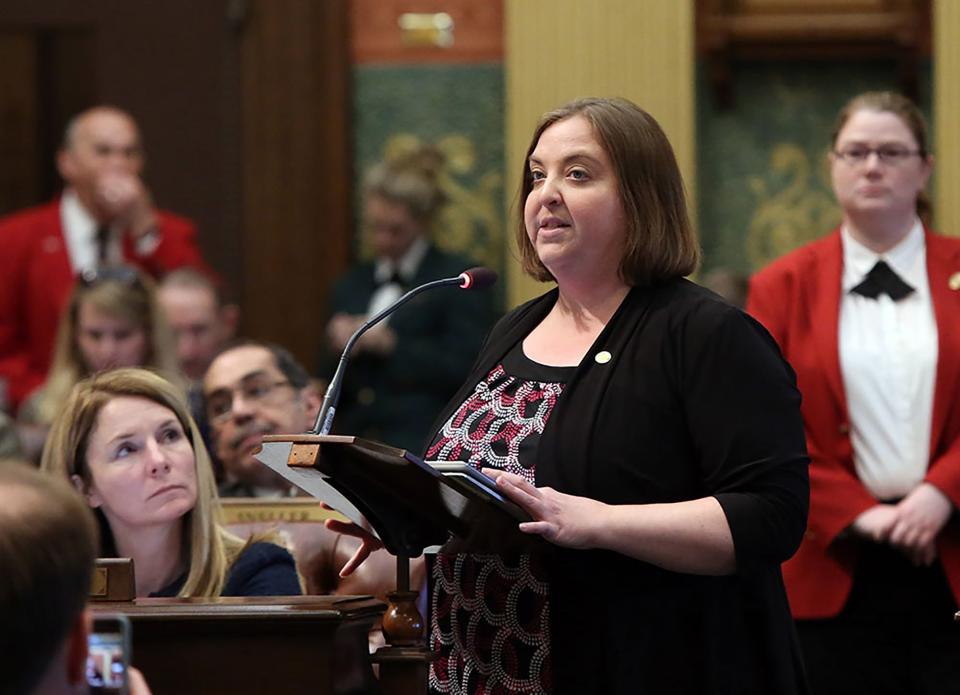
If they win their mayoral primaries on Aug. 8 and general elections on Nov. 7, they'll be sworn into office after the results are certified. It's up to Gov. Gretchen Whitmer to call a special election. She's expected to do so quickly. (Michigan election law doesn't stipulate a deadline for the governor to call a special election.) The Secretary of State's office estimates it will take approximately 120 days to hold a special election if there's a vacancy in a state representative's seat.
If Coleman and Stone win their mayoral races, leaving their seats in Lansing vacant for months will have little impact on state politics, they said. Both point out that their caucus has already moved quickly to pass key Democratic priorities and expect to see a greater focus on bipartisanship when lawmakers return after the summer break. But others see the potential loss of a Democratic majority − even if temporary − putting a damper on Democrats' legislative agenda.
What happens if they win?
For Coleman and Stone, the transition from state representative to mayor would come with upsides: a shorter commute, a higher salary and longer terms.
When it comes to the impact in Lansing, their bids set up a few different outcomes depending on the results of their elections. If Coleman and Stone both lose their mayoral races, they won't have to vacate their seats and can serve the remainder of their terms in the House, allowing Democrats to keep their majority without any interruption. If only one of them wins, that still leaves Democrats with a workable 55-54 majority. But if both win, that leaves Democrats with a 54-54 tie with Republicans. Under this scenario, Tate would continue to serve as speaker with Democrats chairing committees and deciding which bills come to the floor for a vote. (The House rules only allow a new speaker election to be called in the event of a 55-55 split.)
Losing both seats will fundamentally transform the political dynamics in the chamber, said Brandon Dillon, the former chair of the Michigan Democratic Party. "Everything will have to be bipartisan," he said. "That's just the reality."
While both Coleman and Stone would vacate seats in safe Democratic districts that would likely be filled by another Democrat, their absence could shorten the window for passing Democratic priorities ahead of House elections in 2024.
Gun control measures, environmental legislation, LGBTQ rights and protections for reproductive rights are among the Democratic policy proposals at risk of stalling, said Adrian Hemond, the CEO of the Lansing-based political consulting firm Grassroots Midwest who worked in the Michigan House the last time Democrats controlled the chamber.

"Anything that there is not some amount of bipartisan agreement on as an opening bid is potentially at risk," he said. "It's a pretty broad list of policy initiatives that at a minimum, this could cause some potential delay. And depending on the timing of special elections based on when the governor calls them, that puts them bleeding into an election year trying to get stuff done that you don't have bipartisan agreement on."
More: A fire removed this Detroiter from her home, but she continues to provide 'loving' care
More: What happened to all the green? Here's why some pine trees are withering to brown
Coleman and Stone don't see their mayoral bids threatening to slow down things down much in the Legislature. "I definitely believe that regardless of how my race ends, it doesn't change the dynamics in Lansing," Stone said.
Some Democratic lawmakers have expressed support for the decision to seek local office. For instance, state Rep. Dylan Wegela, D-Garden City, wants Coleman to win because he expects Coleman to bring greater transparency in local bidding, government and policing. "Lansing's important, but so is local government," Wegela said.
But Lori Wilson, recording secretary for the Westland Democratic Club expressed concerns that Democratic priorities would be at risk in Lansing. She said in an interview in May that she would prefer to see Coleman finish his term in the state House. If he becomes mayor, "only time will tell what will happen," she said.
Democrats who might prefer Coleman and Stone stay put in Lansing can't do much to keep the representatives in state politics. Pushing back is almost impossible, said former Michigan Democratic Party chair Mark Brewer. Those interested in stopping their bids don't really have any leverage, he said.
House GOP Leader Matt Hall, R-Richland Township, celebrated Coleman and Stone's decision to run for mayor. "They both have my support, that's for sure," he said – followed by a brief chuckle – on a podcast interview with MIRS earlier this year.
A question from the Free Press on the mayoral campaigns posed to House Speaker Joe Tate, D-Detroit, also prompted laughter. But his reaction may have signaled his discomfort with what lies ahead.
He said maintaining a Democratic majority is one of the most important jobs he has. Tate celebrated what Democrats have done with their new power in the Legislature so far. "But I think it will definitely slow things down," he said when asked about the potential even partisan split in the state House Coleman and Stone's mayoral bids could leave him.
'Warren is the biggest small town in Michigan'
Stone is a lifelong Warren resident and former teacher. She didn't specify exactly when she decided to jump into the mayoral race, but she said that she knew it was a possibility when voters reelected her last fall to a third term to the state House with 67% support.
Since then, Stone has been busy with no break from the campaign trail. When she's back home in Warren, she said she's knocking on voters' doors four days a week and phone banking when she's in Lansing. That's how to win an election without money, she said.
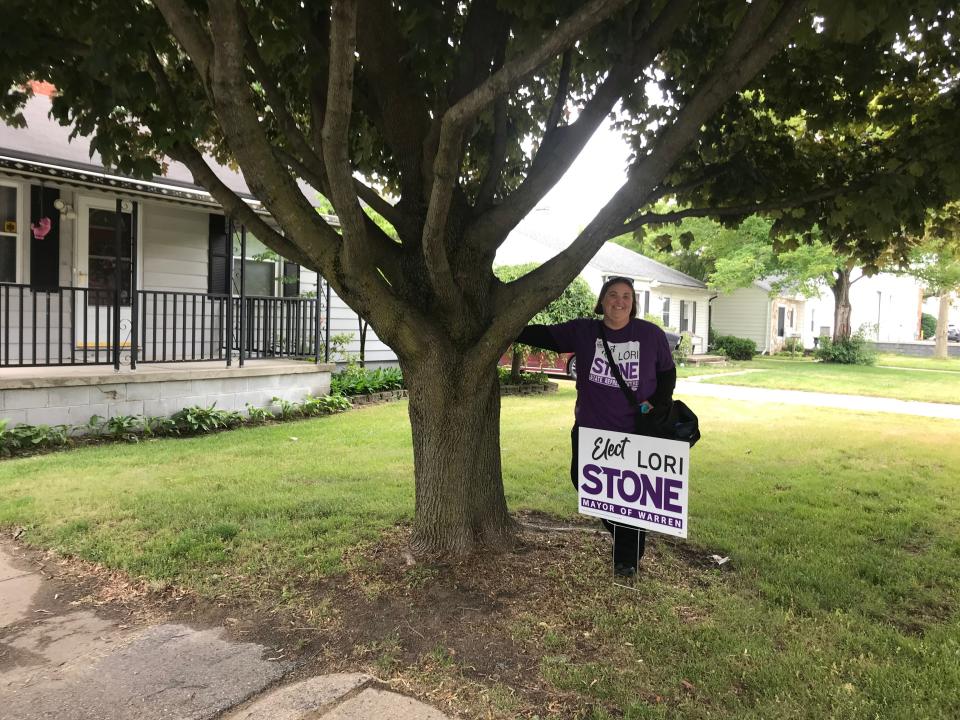
She's one of six candidates vying to serve as Warren's next mayor. The field became less crowded when longtime Mayor Jim Fouts was declared ineligible to seek a fifth term.
One of her opponents in the race – City Council President Patrick Green – questioned why Stone sought reelection to the state House if she was eyeing a mayoral bid the next year.
"Then why did you run?" he said. "Everyone I know in Lansing is concerned about it."
But Stone said she loves where she's from and if elected as mayor wants to prioritize investing in parks and recreation, economic development and senior services among other areas.
"I call Warren the biggest small town in Michigan," she said, on a brisk evening in June as she knocked on voters' doors. She came across one home with her mayoral campaign sign featuring her name in bold, purple text, her favorite color.

Stone stopped by to greet 88-year-old Genevieve Lane. "I'll support her as long as I can," Lane said. She said fixing Warren's roads is her biggest priority as a voter.
For others, like Stone campaign volunteer Gerald Hasspacher, environmental issues top the list.
"Macomb County really is far behind Oakland County on environmental action, and we need to catch up," he said.
He said that Warren city leaders also haven't done enough to create a community feeling in urban planning. "I think we're more focused on making sure that we have malls, and that you can buy anything you want close to home," he said. Meanwhile, he said the city is failing to attract young people. "We've been stuck in the 1960s."
At 43, Stone is the youngest candidate in the race.
'My heart is here'
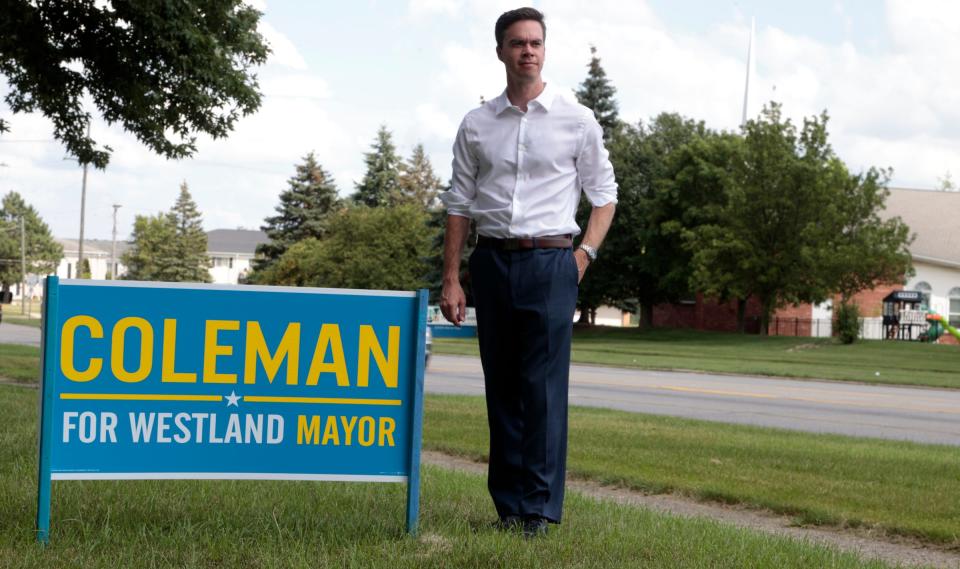
Unlike Stone − who hopes voters will elect her to local office for the first time after working in state politics − Coleman has experience serving at the local level. He previously served on Westland City Council, lost a bid to Wild for mayor in 2017 and went on to win election to the state House in 2018.
"I find statewide policy intriguing, and I enjoy the work that I do," he told the Free Press in May. "But I think my heart is here, in the community."
"There's a lot of need here, and I think I can make an even stronger impact leading the city as mayor," he added.
He's one of six mayoral candidates competing in the August primary.
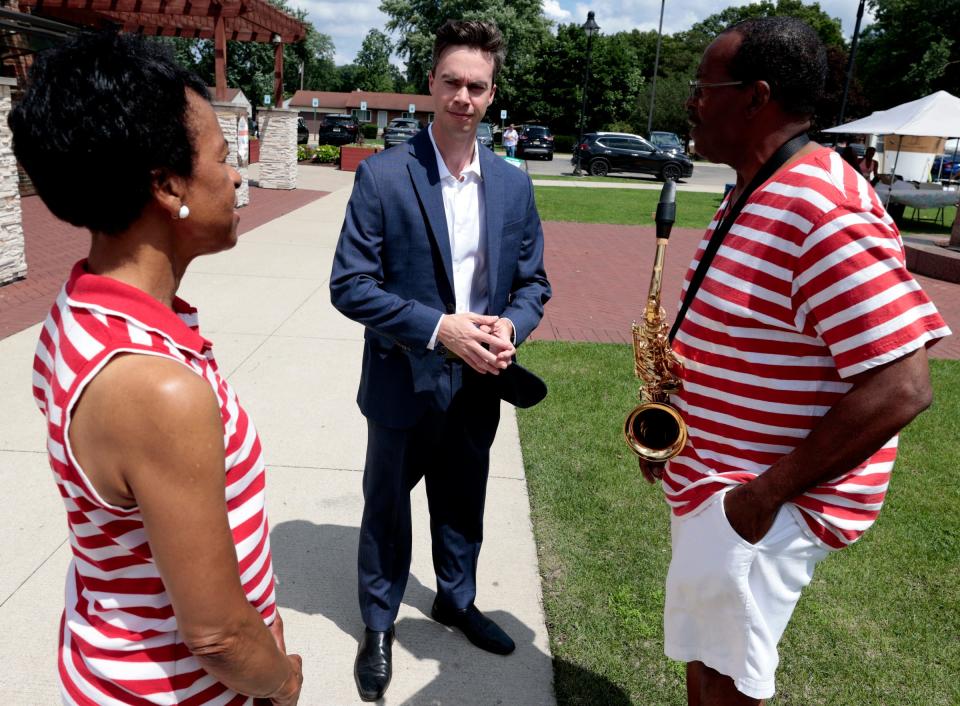
From his post in Lansing, he has criticized one of his opponents in the race: interim Westland Mayor Mike Londeau who's finishing out the remainder of Wild's term. Coleman accused Londeau of sitting on videos showing the city's then-police chief verbally harassing and humiliating citizens as a patrol officer 20 years ago by asking detainees to sing, breakdance and perform a headstand to avoid jail time.
"Like they're in a minstrel show," said Wilson from the Westland Democratic Club.
Londeau ultimately supported the chief's resignation, but the fallout is continuing to play out in the mayoral race.

The next mayor will have to contend with the "perception of Westland as a non-welcoming city in regards to the police department," said Arthur Warren, chair of the Westland Democratic Club. "I think that's going to be a challenge for a lot of mayors. If they're truly talking about being 'An All American City', they have to get rid of that perception," he said, referring to Westland's motto.
The upcoming mayoral primaries in Warren and Westland will decide whether Coleman and Stone advance to the November general election and what's in store for Democrats in Lansing.
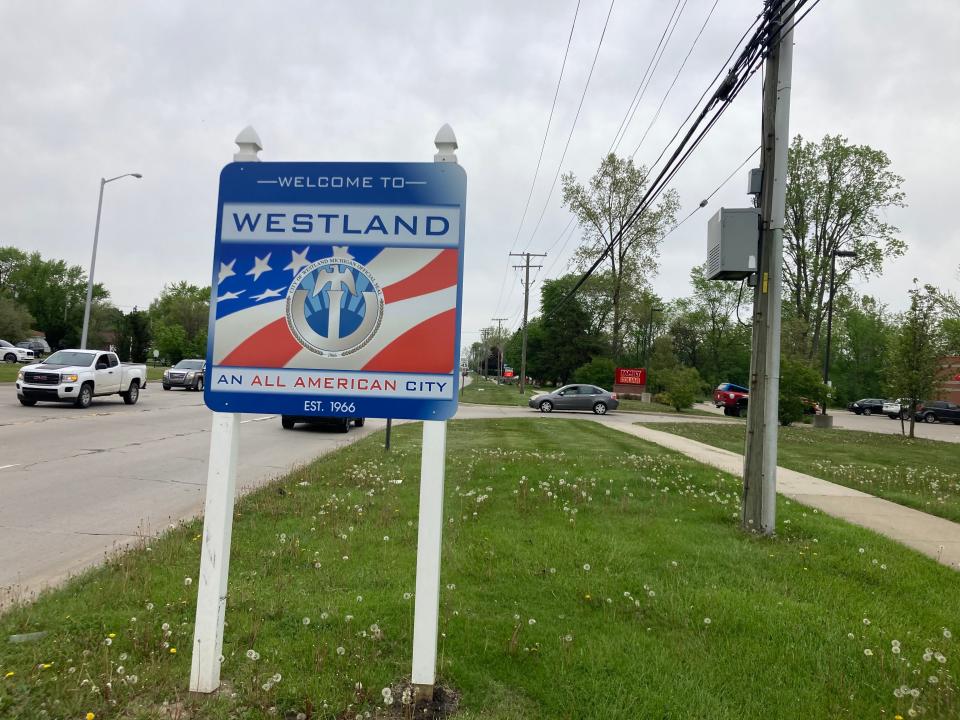
But one thing is clear to the chair of the Westland Democratic Club from Democrats' first several months in power: their majority in Lansing is fragile. And even a safe Democratic seat is not certain to stay blue. "There's no guarantees of what will happen," Warren said.
Contact Clara Hendrickson at chendrickson@freepress.com or 313-296-5743. Follow her on Twitter @clarajanehen.
This article originally appeared on Detroit Free Press: Mayoral bids could shake up Dems' majority in Michigan House

